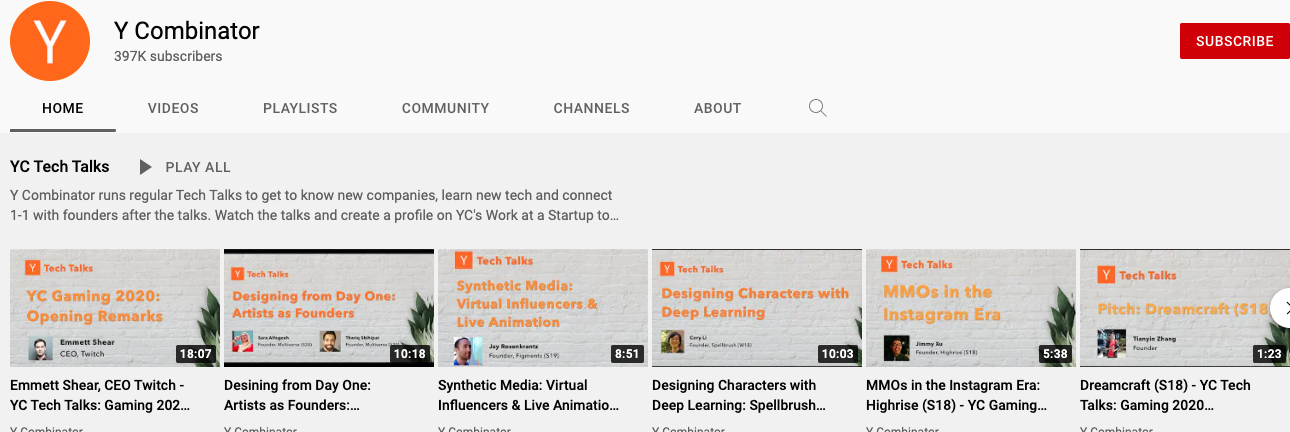Useful Startup Resources
Ever wanted to make something of your own? Well, so have I.
Getting into startups is a completely unfamiliar territory for the first time…
BUT there are resources which can help you get a few answers to the questions like why, who, when, where, what.
Introduction
At some some point in their life each person thinks something of the following:
- under the shower “… a missing-sock-searching machine. What if I created that?”
- behind a company desk “If they could created this company, why couldn’t I?”
- in university “Hmm this seems interesting, I wonder if someone else would use it”
People like building something of their own and it somehow fulfills us if there are others that find our solution usable. Moreover, if people are willing to pay for the solution, you get the ultimate approval of what you’re doing is right.
But what’s next? Well read on.
Resources
PG
There are quite a few guides which let you know what you can expect starting out. But I would recommend one that was written by someone with a LOT of experience in this field; Paul Graham. Paul is the founder of
- Viaweb, web-based application for building and hosting online stores using a web browser
- YCombinator, a US technology startup accelerator, which funded companies like Airbnb, Doordash, Coinbase, Stripe, Reddit, and others.

Why Paul is being mentioned as a valuable resource is because of his essays, which can be found on his blog/website. The blog contains a lot of valuable information regarding starting a startup, getting funding, validating ideas,.. and so on.
Paul shares his experiences from a few perspectives:
- as the founder of Viaweb and YCombinator
- as an investor of YCombinator startups
- as a mentor to YCombinator startups
To help you a bit with this, I have taken notes of all his essays about startups and gathered them here:
Feel free to check it out, contribute to it and share it to young motivated guys and gals wanting to create a startup of their own.
YCombinator Youtube Channel
Apart from PG’s essays, one of the biggest resources is the YCombinator’s channel with tons of useful videos.
There are many different categories on that channel:
- talks from successful startup founders
- talks form YCombinator founders on startups
- interviews of startup founders and more.
You can check it out right about HERE.
I personally really like Michael Seibel’s takes on startups as he went through the same steps with his own startup and now has an overview of others going through the same stuff within YCombinator. Michael is a co-founder of JustinTV, nowadays known as Twitch and is now the Managing Director of YCombinator.

MicroConf Youtube Channel
YCombinator is primarily focused to invest a small amount in the startup and at the end of their 3-month program lets startups pitch to bunch of investors on D-day, called Demo day.
Well there’s another way. Without getting any funding and retaining all the equity to yourself, which is called Bootstrapping.
The main thing for bootstrappers is the “becoming ramen profitable” as soon as possible so they can live off of the revenue and survive with it.
One of the best Youtube channels for bootstrappers is definitely MicroConf. Check it out, there’s a lot of videos from bootstrap founders.

Quite some subreddits have emerged where startup founders and entrepreneurs discuss ways to get their product/service off the ground.
Subreddits that I’ve come accross are:
Solo bootstrappers
A lot of solo bootstrappers have started their one-man-band company which brings in enough money to pay the living expenses. A big percentage of these quit their job in order to pursue evolving their baby projects which, in case they do it at the right time in the right way, can make, by my standards, a hell lot of money.
One of the most known bootstrappers is levelsio, the creator of NomadList, RemoteOk, Workers.co and a few more. He became quite famous with his “12 startups in 12 moths” stunt in 2014, which you can read more about on his blog.
It was even featured on Wired!

He has a lot of cool tweets about bootstrapping, open startup finances, fast shipping of new ideas and he was not even a programmer to begin with.
Shipping the product
Once the product is ready for the first users, and it should reach this stage as fast as possible, it needs to get the first set of users. One of the toughest things is to get to your first users and unless you already have a big reach on Twitter/Instagram/Facebook/LinkedIn, it’s gonna be quite a hassle.
Fortunately there are a few channels where you can start out.
KickStarter
The biggest known fund-my-project platform is definitely KickStarter.
People pre-order the products by giving funds to projects they love and in exchange they get certain discounts or extra addons as a bonus for being an initial customers. The products are all pre-ordered and go into production if the project gets enough funding.
ProductHunt
ProductHunt has became a very known place where the, already a bit more polished, products see the light of day.
Mostly ProductHunt projects are software-based, but there were also some notable hardware products published.
It’s not a funding platform like KickStarter, but it’s kind of a “presentational” site for the initial user base.
Getting an exit
At some point startups tend to have an exit. An exit, for the general public, is selling the company/startup. Either some bigger company acquires it or it banks for IPO (initial public offering).
IPO means that the startup’s/company’s shares are released to the public, anyone can buy the shares on a stock exchange (NASDAQ,…).
But let’s focus on selling a smaller startup. Do you need to manually find someone and persuade him into buying your company?
Not really, there are now platforms for selling and buying startups.
MicroAcquire
Team @microacquire has helped 100s of startups get acquired and has facilitated $100m+ in closed deals.
— Andrew Gazdecki (@agazdecki) November 13, 2021
Our mission is to bring the startup acquisition market together with trust, transparency, & ease of use.
For the love of startups! 🤘 pic.twitter.com/6ImIrlqgit
Like the name suggests, MicroAcquire is a platform for buying and selling of startups. Mostly there are minor startups that are being sold or bought on their platform, but there have also been quite large acquisitions.
Conclusion
Creating a startup and getting enough revenue to live of of, isn’t anywhere near easy, but once you get a hang of it and preferably reach product market fit, sky is the limit.
Helping you out at the beginning of your journey are the resources and tools mentioned above.





